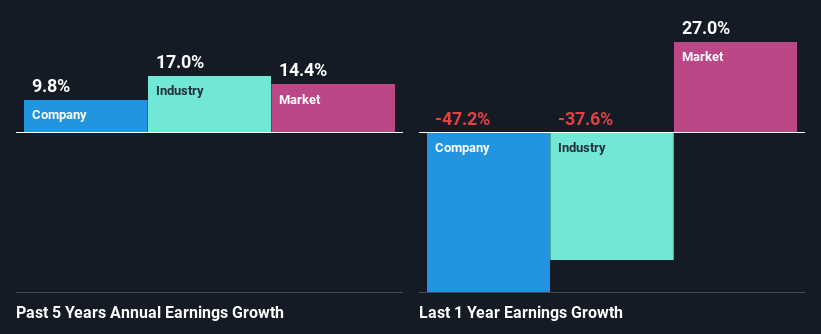Has Autohome Inc.'s (NYSE:ATHM) Impressive Stock Performance Got Anything to Do With Its Fundamentals?
Autohome's (NYSE:ATHM) stock is up by a considerable 42% over the past three months. We wonder if and what role the company's financials play in that price change as a company's long-term fundamentals usually dictate market outcomes. Specifically, we decided to study Autohome's ROE in this article.
Return on equity or ROE is a key measure used to assess how efficiently a company's management is utilizing the company's capital. In other words, it is a profitability ratio which measures the rate of return on the capital provided by the company's shareholders.
Check out our latest analysis for Autohome
How To Calculate Return On Equity?
The formula for return on equity is:
Return on Equity = Net Profit (from continuing operations) ÷ Shareholders' Equity
So, based on the above formula, the ROE for Autohome is:
7.6% = CN¥1.8b ÷ CN¥24b (Based on the trailing twelve months to March 2022).
The 'return' is the yearly profit. So, this means that for every $1 of its shareholder's investments, the company generates a profit of $0.08.
What Has ROE Got To Do With Earnings Growth?
Thus far, we have learned that ROE measures how efficiently a company is generating its profits. Based on how much of its profits the company chooses to reinvest or "retain", we are then able to evaluate a company's future ability to generate profits. Generally speaking, other things being equal, firms with a high return on equity and profit retention, have a higher growth rate than firms that don’t share these attributes.
Autohome's Earnings Growth And 7.6% ROE
At first glance, Autohome's ROE doesn't look very promising. However, the fact that the company's ROE is higher than the average industry ROE of 6.4%, is definitely interesting. Consequently, this likely laid the ground for the decent growth of 9.8% seen over the past five years by Autohome. That being said, the company does have a slightly low ROE to begin with, just that it is higher than the industry average. So there might well be other reasons for the earnings to grow. Such as- high earnings retention or the company belonging to a high growth industry.
Next, on comparing with the industry net income growth, we found that Autohome's reported growth was lower than the industry growth of 17% in the same period, which is not something we like to see.
The basis for attaching value to a company is, to a great extent, tied to its earnings growth. What investors need to determine next is if the expected earnings growth, or the lack of it, is already built into the share price. By doing so, they will have an idea if the stock is headed into clear blue waters or if swampy waters await. What is ATHM worth today? The intrinsic value infographic in our free research report helps visualize whether ATHM is currently mispriced by the market.
Is Autohome Efficiently Re-investing Its Profits?
In Autohome's case, its respectable earnings growth can probably be explained by its low three-year median payout ratio of 20% (or a retention ratio of 80%), which suggests that the company is investing most of its profits to grow its business.
While Autohome has seen growth in its earnings, it only recently started to pay a dividend. It is most likely that the company decided to impress new and existing shareholders with a dividend. Our latest analyst data shows that the future payout ratio of the company over the next three years is expected to be approximately 17%. As a result, Autohome's ROE is not expected to change by much either, which we inferred from the analyst estimate of 8.2% for future ROE.
Summary
In total, it does look like Autohome has some positive aspects to its business. Specifically, we like that the company is reinvesting a huge chunk of its profits at a respectable rate of return. This of course has caused the company to see a good amount of growth in its earnings. Having said that, the company's earnings growth is expected to slow down, as forecasted in the current analyst estimates. Are these analysts expectations based on the broad expectations for the industry, or on the company's fundamentals? Click here to be taken to our analyst's forecasts page for the company.
Have feedback on this article? Concerned about the content? Get in touch with us directly. Alternatively, email editorial-team (at) simplywallst.com.
This article by Simply Wall St is general in nature. We provide commentary based on historical data and analyst forecasts only using an unbiased methodology and our articles are not intended to be financial advice. It does not constitute a recommendation to buy or sell any stock, and does not take account of your objectives, or your financial situation. We aim to bring you long-term focused analysis driven by fundamental data. Note that our analysis may not factor in the latest price-sensitive company announcements or qualitative material. Simply Wall St has no position in any stocks mentioned.

 Yahoo Movies
Yahoo Movies 

